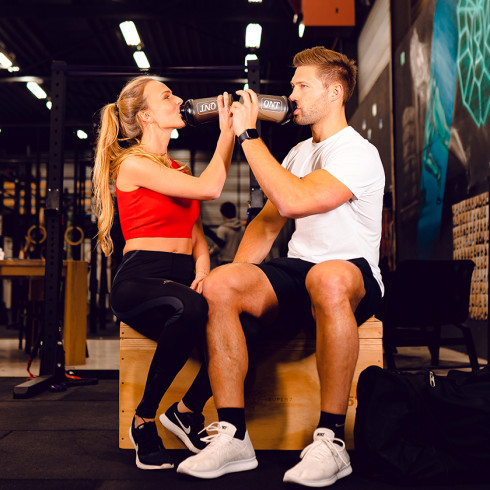The 7 best tips to optimize your sports nutrition.
Hydration Optimization: Water, Source of Life and Performance.
Hydration is the cornerstone not only of our survival but also of our ability to perform at our peak. For an athlete, water is not just a beverage: it's fuel, lubricant, and a means of thermal regulation. Here's why and how to optimize your hydration for every workout session.
Why is Hydration so Crucial ?
- Thermal Regulation: When you exercise, your body generates heat. Water helps regulate your body temperature through sweating, preventing overheating and allowing your muscles to function efficiently.
- Nutrient Transport: Adequate hydration facilitates the transport of essential nutrients to your cells, including muscles, thereby improving energy and recovery.
- Waste Removal: Drinking enough helps eliminate metabolic waste produced during exercise, such as lactic acid, thereby reducing fatigue and muscle soreness.
How to Optimize Your Hydration ?
- Before Exercise: Start well-hydrated. Drink about 500 ml of water two to three hours before starting your workout to ensure baseline hydration.
- During Exercise: Don't wait until you're thirsty to drink. Consume small amounts of water regularly every 15 to 20 minutes, especially during intense sessions or in hot environments.
- After Exercise: Rehydrate to compensate for fluid loss. A good rule of thumb is to drink about 500 ml of water for every half kilogram lost during exercise.
Signs of Dehydration to Watch For.
Even mild dehydration can affect your performance and concentration. Be attentive to signs of dehydration, such as increased thirst, dark urine, fatigue, dizziness, or decreased performance.
The Importance of Quality Water.
The quality of the water you drink is just as important as the quantity. Filtered or spring water, rich in minerals, can contribute to better hydration and overall health.
Optimal hydration is a key factor in achieving your ideal form and unlocking your full potential. Don't forget the importance of water not only as a source of life but as a pillar of your athletic success. Always make it a habit to hydrate well to elevate your performance to new heights.
MACRONUTRIENT BALANCE: THE KEY TO MAXIMIZING PERFORMANCE AND RECOVERY.
The balance of macronutrients - proteins, carbohydrates, and fats - is essential for optimizing your athletic performance and recovery. Each of these nutrients plays a specific and complementary role in your diet, working together to support you in your quest for your ideal form. Here's how these elements intertwine to help you achieve your goals.
Proteins: The Builders of Muscle.
- Role: Proteins are the fundamental building blocks of your muscles. They are crucial for muscle repair and growth after exercise. Without adequate protein intake, your body cannot effectively repair itself, limiting your gains in strength and muscle mass.
- Sources: Lean meats, fish, dairy products, legumes, and nuts. Protein supplements, such as those offered by QNT, can also help meet your daily needs, especially post-workout.
Carbohydrates: The Fuel for Energy.
- Role: Carbohydrates are your primary source of energy. They fuel your workout sessions and aid in recovery by replenishing depleted muscle glycogen stores during exercise.
- Sources: Fruits, vegetables, whole grains, and legumes. Fast-digesting carbohydrates, such as fruits, are particularly useful post-workout for quick recovery.
Fats: Supporters of Overall Health.
- Role: Fats play a crucial role in hormonal health, absorption of fat-soluble vitamins, and organ protection. They also provide a dense source of energy for long-duration, low-intensity exercises.
- Sources: Vegetable oils, nuts, seeds, avocados, and fatty fish. Omega-3 fatty acids, in particular, are beneficial for heart health and inflammation.
Finding the Right Balance.
- Personalization: The ideal macronutrient balance varies from person to person, depending on age, gender, activity level, fitness goals, and personal preferences. A sports coach or nutritionist can help you determine the best balance for you.
- Listen to Your Body: Pay attention to how your body reacts to different macronutrient balances. Some may feel better with more carbohydrates, while others prefer a higher protein diet.
Macronutrient balance is fundamental to support your training, recovery, and overall health. By carefully adjusting your intake of proteins, carbohydrates, and fats, you can maximize your performance and accelerate your recovery, bringing you closer to your ideal form.
MEAL TIMING: SYNCHRONIZING NUTRITION AND PERFORMANCE.
Meal timing is a powerful lever to optimize your athletic performance and recovery. Eating the right nutrients at the right time can literally make a difference, allowing you to get the most out of each workout and accelerate your recovery. Here's how to synchronize your nutrition with your physical activity for optimal results.
Before Training: Fuel for Performance.
- Objective: Before training, the goal is to provide your body with the necessary energy to support intense activity and prevent muscle fatigue.
- What to Eat: Opt for a meal or snack rich in complex carbohydrates and proteins. Carbohydrates will provide you with sustained energy, while proteins will prepare your muscles for exertion.
- When to Eat: Consume this meal or snack about 1 to 3 hours before your workout. This allows enough time for your body to digest and convert the food into energy.
During Training: Hydration and Energy.
- Objective: Maintain hydration and, for prolonged workouts, supplement energy.
- What to Drink/Eat: For most, water will suffice to stay hydrated. For activities lasting more than 60 minutes, consider sports drinks containing electrolytes and simple carbohydrates to maintain energy and hydration.
After Training: Recovery and Rebuilding.
- Objective: After training, the goal is to repair damaged muscles, replenish depleted energy stores, and accelerate recovery.
- What to Eat: A meal or snack rich in proteins and carbohydrates is ideal. Proteins support muscle repair and growth, while carbohydrates help replenish muscle glycogen. This is the moment when intake of fast sugars is interesting for better recovery.
- When to Eat: The opening of the "anabolic window" suggests consuming these nutrients within 30 to 45 minutes after training to maximize recovery and muscle growth potential.
Tips for Optimizing Meal Timing.
- Planification: Plan your meals and snacks around your training schedule to ensure you're consuming the right nutrients at the best time.
- Listen to Your Body: Digestion and fuel response vary from person to person. Adjust the timing and composition of your meals based on what makes you feel best.
- Flexibility: Life is unpredictable. If you can't eat ideally before or after training, aim to consume a nutrient-rich snack as soon as possible.
Meal timing is a crucial aspect of your nutritional strategy, directly influencing your ability to perform and recover. By adjusting when and what you eat around your workout sessions, you can maximize the effectiveness of your diet and move closer to your fitness goals.
QUALITY SUPPLEMENTS: AMPLIFYING PERFORMANCE AND RECOVERY.
In the quest for ideal fitness and optimal athletic performance, dietary supplements play a crucial role. They are allies that fill nutritional gaps, boost your performance, and accelerate your recovery. Let's explore how quality supplements, like those offered by QNT, can help you achieve your goals.
Why Choose Quality Supplements ?
- Fill Nutritional Gaps: Even with a balanced diet, it can be challenging to obtain all the nutrients necessary for optimal performance and recovery. Dietary supplements provide these essential nutrients in a concentrated and easily absorbable form.
- Enhance Performance: Some supplements are designed to improve strength, endurance, and focus during training, allowing you to push harder and longer.
- Accelerate Recovery: Recovery is just as important as training itself. Supplements like protein powder, BCAAs (branched-chain amino acids), and natural anti-inflammatories can help repair muscles and reduce post-workout soreness.
Choosing the Right Supplements.
- Protein Powders: A cornerstone for muscle repair and growth. Whey, casein, or plant-based proteins offer a high-quality protein source that aids in muscle recovery.
- BCAAs: Branched-chain amino acids support muscle protein synthesis, reduce fatigue, and facilitate muscle recovery.
- Creatine: Enhances performance in high-intensity activities and strength sports by increasing ATP availability, the main energy source for muscles.
- Omega-3: Omega-3 fatty acids have anti-inflammatory effects, support heart health, and may improve muscle recovery.
Ensuring Supplement Quality.
- Research and Transparency: Choose supplements from reputable brands that invest in research and are transparent about the sourcing and composition of their products.
- Certifications: Prioritize products certified by third parties to ensure their purity and quality.
- Customization to Needs: Select supplements tailored to your specific goals, whether it's improving performance, recovery, or addressing nutritional gaps.
Quality supplements are powerful tools for maximizing your athletic performance and optimizing your recovery. By choosing the right products, such as those offered by QNT, you ensure that you're supporting your body with the nutrients it needs to excel and move closer to your ideal form. With a targeted approach and high-quality products, each supplement is a step towards achieving your goals.
Dietary Diversity: A Rainbow of Nutrients for Performance and Health.
Dietary diversity isn't just about enjoying different flavors; it's a key nutritional strategy for optimizing your athletic performance and maintaining robust overall health. By incorporating a variety of foods into your diet, you ensure that you're getting a broad spectrum of essential vitamins, minerals, and antioxidants. Let's explore how this diversity can propel you toward your goals.
Why is Dietary Diversity Crucial ?
- Full Spectrum of Nutrients: Each food brings its own set of nutrients. By diversifying your diet, you maximize your chances of obtaining all the components necessary for optimal performance and recovery.
- Gut Health: A varied diet promotes diverse gut flora, which is essential for good digestion, nutrient absorption, and a strong immune system.
- Prevention of Deficiencies: Diversifying your food sources reduces the risk of nutritional deficiencies, which is crucial for maintaining a high level of performance and good health.
How to Incorporate Dietary Diversity ?
- Colors on Your Plate: Aim to include a variety of colors in your meals. Each color represents a different set of antioxidants and nutrients. For example, green vegetables are rich in vitamin K and iron, while red fruits offer an abundance of antioxidants.
- Vary Protein Sources: Alternate between animal and plant sources of protein to benefit from different amino acid profiles and nutrients. Think about fish, meat, legumes, and nuts.
- Experiment with Whole Grains: Instead of sticking to rice and wheat, explore other grains like quinoa, amaranth, and millet, which offer unique fibers, proteins, and minerals.
- Include a Variety of Healthy Fats: Omega-3 fatty acids from fatty fish, monounsaturated fats from olive oil, and polyunsaturated fats from nuts and seeds all play an important role in heart health and inflammation reduction.
Balancing Diversity and Personal Needs.
- Listen to Your Body: While diversity is important, it's also crucial to listen to your body and adjust your diet based on your individual reactions and specific nutritional needs.
- Planning and Preparation: Plan your meals in advance to ensure you include a variety of foods throughout the week. Meal prep can help you maintain this diversity without feeling overwhelmed.
Dietary diversity is your key to unlocking maximum performance and maintaining optimal health. By embracing a range of nutrients through a varied diet, you support all aspects of your physical and mental health, bringing you closer to your optimal form.
LISTENING TO YOUR BODY: THE KEY TO PERSONALIZED SPORTS NUTRITION.
Listening to your body is fundamental in optimizing your sports nutrition. Every athlete is unique, with specific needs and reactions to their own body. What works for one may not work for another. Personalizing your nutrition based on your personal sensations and reactions is essential to achieving your performance and well-being goals. Let's explore how you can refine your nutritional approach by listening to your body.
Why is Listening to Your Body Crucial ?
- Individual Responses: Each person has unique metabolic, digestive, and energy responses to different types of foods and diets. Recognizing these responses allows you to adjust your nutrition to optimize your performance and recovery.
- Prevention of Intolerances and Allergies: By paying attention to your body's signals, you can identify foods that don't suit you, thus avoiding digestive discomfort, inflammation, and other negative reactions.
- Adaptation to Changes: Your body and nutritional needs evolve over time, training, age, and seasons. Active listening enables you to adapt your nutrition to meet these dynamic changes.
How to Listen to and Respond to Your Body ?
- Food and Sensation Journal: Keeping a journal where you note what you eat and how you feel afterward can help you identify trends and specific reactions to certain foods or diets.
- Pay Attention to Hunger and Satiety Signals: Learn to recognize your body's hunger and satiety signals to adjust the quantities you consume based on your actual energy needs.
- Evaluate Performance and Recovery: Note how different diets affect your sports performance and recovery. This may include aspects such as energy levels during training, ease of recovery, and sleep quality.
- Consultation with Specialists: Working with a sports nutritionist can help you interpret your body's signals and develop a personalized nutrition plan based on your observations and specific needs.
Flexibility and Open-Mindedness.
- Experimentation: Be open to experimenting with different foods, meal timings, and macronutrient compositions to discover what works best for you.
- Adaptability: Be prepared to adjust your nutrition based on feedback from your body, changes in your training, and your short and long-term goals.
Listening to your body is a personal and dynamic process that requires attention and adaptation. By customizing your sports nutrition according to your unique reactions and needs, you maximize your performance, recovery, and overall well-being.
REST AND RECOVERY: THE PILLARS OF PERFORMANCE AND WELL-BEING.
Rest and recovery are as crucial as training itself to achieve your sports goals and maintain optimal health. While nutrition plays an essential role in muscle recovery, rest allows your body to regenerate and fully utilize the nutrients you provide it. Let's explore how sleep and rest influence your performance and how to optimize them.
The Importance of Rest for Recovery.
- Muscle Repair: During sleep, your body produces growth hormones, essential for muscle repair and growth. Inadequate sleep can limit this production, hindering your recovery.
- Energetic Restoration: Rest helps replenish your body's energy reserves, including muscle glycogen, allowing you to be ready for your next workout.
- Inflammation Reduction: Sleep plays a role in reducing inflammation, a crucial aspect of recovery after intense physical activity.
Optimizing Rest and Recovery.
- Sleep Quality: Aim for 7 to 9 hours of quality sleep each night. Ensure your bedroom is dark, quiet, and at a comfortable temperature to promote deep sleep.
- Bedtime Routines: Establish a regular bedtime routine to help your body prepare for sleep. This may include relaxing activities such as reading, gentle yoga, or breathing exercises.
- Stress Management: Stress can significantly impact the quality of your sleep and your ability to rest. Practice stress management techniques such as meditation, journaling, or nature walks to help relax your mind.
- Active Rest Days: Incorporate active rest days into your training program, where you engage in light physical activities like walking, yoga, or swimming. This helps maintain blood circulation while allowing your muscles to recover.
Listening to Your Body.
- Recognizing Signs of Fatigue: Pay attention to signs of excessive fatigue, persistent muscle soreness, or decreased performance, which may indicate an increased need for rest.
- Adapting Training: If you're feeling particularly tired or recovering from an intense workout, don't hesitate to adjust your program to allow for adequate recovery.
Rest and recovery aren't just breaks in your training; they're essential for allowing your body to rebuild stronger. By paying close attention to the quality of your sleep and incorporating periods of active rest, you maximize the benefits of your sports nutrition and support your progression towards your goals.
Coach's Advice.

- In optimal sports nutrition, dietary supplements allow you to provide your body with all the essential nutrients for good health without having to consume too many calories. Wanting to absorb everything your body needs is commendable, but not always easy with traditional foods. Supplements are a significant convenience.
- Even though some rules apply to many, there's no guarantee they'll work for you! Take the time to discover what truly suits your body. And remember, always be ready to question these rules because your body evolves!
Related posts
-
 Summer holidays: How to limit the damage?
Posted in: Our tips24/06/2021On holiday, we often tend to let ourselves go. Unless you're a hardcore sportsman, you tend to abandon your trainers...Read more
Summer holidays: How to limit the damage?
Posted in: Our tips24/06/2021On holiday, we often tend to let ourselves go. Unless you're a hardcore sportsman, you tend to abandon your trainers...Read more -
 Which fat burner to choose?
Posted in: Our tips26/05/2021To lose weight and burn fat, there is no secret: you have to do sport and take care of your diet. However, it is...Read more
Which fat burner to choose?
Posted in: Our tips26/05/2021To lose weight and burn fat, there is no secret: you have to do sport and take care of your diet. However, it is...Read more -
 Summer body edition for men: How to prepare your body?
Posted in: Our tips11/05/2021Gentlemen ? The return of the sun and its warm rays are almost here! The degrees are slowly but surely rising, but...Read more
Summer body edition for men: How to prepare your body?
Posted in: Our tips11/05/2021Gentlemen ? The return of the sun and its warm rays are almost here! The degrees are slowly but surely rising, but...Read more -
 9 good reasons to do sport.
Posted in: Our tips22/04/2021Sometimes the urge to exercise is not always there. And although we always tell ourselves that this year will finally...Read more
9 good reasons to do sport.
Posted in: Our tips22/04/2021Sometimes the urge to exercise is not always there. And although we always tell ourselves that this year will finally...Read more -
 Discover how to take care of your faithful companion: your shaker!
Posted in: Our tips07/04/2021In your bag, in your hand, in your sink, it is everywhere! The shaker is an essential element of any good training....Read more
Discover how to take care of your faithful companion: your shaker!
Posted in: Our tips07/04/2021In your bag, in your hand, in your sink, it is everywhere! The shaker is an essential element of any good training....Read more
Blog categories
Popular posts
-
 Looking thinner but at a heavier weight? Is that possible?04/10/2021Posted in: Our tipsAdvertising has shaped our thinking! We have been forced for years to believe that losing weight is the key to having...Read more
Looking thinner but at a heavier weight? Is that possible?04/10/2021Posted in: Our tipsAdvertising has shaped our thinking! We have been forced for years to believe that losing weight is the key to having...Read more -
 Proteins for weight loss !29/12/2023Posted in: Our tipsDive into the fascinating world of proteins and their key role in weight loss. Discover how to choose the best...Read more
Proteins for weight loss !29/12/2023Posted in: Our tipsDive into the fascinating world of proteins and their key role in weight loss. Discover how to choose the best...Read more -
 Which foods boost testosterone levels ?07/05/2021Posted in: Food supplementsTestosterone, often associated with virility, has much more to offer than you might think. It plays a crucial role in...Read more
Which foods boost testosterone levels ?07/05/2021Posted in: Food supplementsTestosterone, often associated with virility, has much more to offer than you might think. It plays a crucial role in...Read more -
 10 BENEFITS OF GLUTAMINE.02/01/2024Posted in: Our tipsDiscover the power of L-glutamine, an underrated superhero in the world of amino acids! Essential for revitalizing...Read more
10 BENEFITS OF GLUTAMINE.02/01/2024Posted in: Our tipsDiscover the power of L-glutamine, an underrated superhero in the world of amino acids! Essential for revitalizing...Read more -
 Is there a link between sex and sport?14/11/2019Posted in: LifestyleMany have already asked questions about sex and sport. Most of the time, people want to be reassured by the many...Read more
Is there a link between sex and sport?14/11/2019Posted in: LifestyleMany have already asked questions about sex and sport. Most of the time, people want to be reassured by the many...Read more

.jpg)

